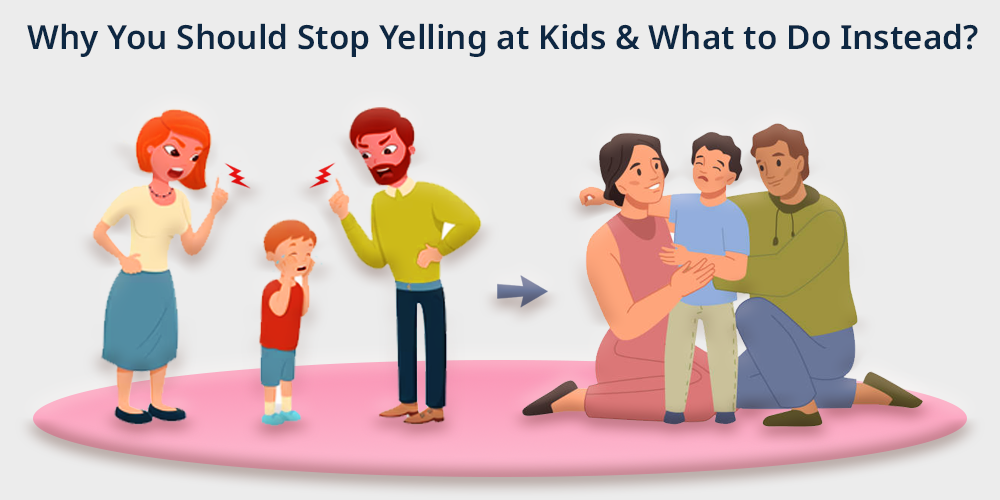
Yelling at kids is one of the major issues at an early age. Yelling is a short-term solution to teach behavior or discipline among children by means of harsh words or verbal language.
Yelling not only creates depression among children but also hinders their overall growth.
Yelling is a harsh method of creating discipline among children by using verbal abuse. Sometimes, when parents are exhausted or have a lot of work pressure on them, they may occasionally lose control of their words and temper over children’s.
As a parent, it is essential to control your anger and stop yelling at kids. According to research, 41% of parents yell at their kids due to stress and workload to relieve some pressure.
As per the research, parents frequently experience fatigue and intense emotions, which can lead to annoyance and yelling at their kids for even small losses.
Yelling at kids is easy out because they are more vulnerable and less likely to argue about the situation.
Table of Contents
What are the Effects of Yelling at your Child?
Yelling at your kid is one of the worst ways to develop fine motor skills. Yelling will impact children’s mental health, emotional, and physical skills.
Daily yelling at kids will make them believe that they are bad kids and what went wrong. It also affects the cognitive development of kids.
Yelling at kids will impact their abilities negatively and reduce their productivity. Yelling creates lots of hindrances among children in various perspectives; as a parents, they need to check whether they are affected negatively.
Below, you can check the effects of yelling at your child.
1. Cause of Depression:
One of the major issues of yelling is that it causes kids to go into depression. As regular yelling will create a sense of self-esteem and reduce their confidence, this will cause them to perform poorly in academics as well as from a future perspective.
Through regular yelling, children develop fear of their parents, and hence, psychologically become weak and suffer damage to their minds.
2. Affects Physical Health:
Yelling at kids will affect them in terms of physical health. Regular use will cause them to develop fear and constraints that create long-term health-related issues among students.
In childhood, children can develop headaches, fevers, anxiety, stress, and so on that continue into adulthood. This makes kids live their lives in difficult settings. It also causes them to perform poorly in professional life.
3. Creates Lifelong Trauma:
Yelling causes children to develop lifelong trauma. Yelling at kids will hamper the relation between child and parent and develop a sense of insecurity towards parents.
Daily yelling will hamper emotional bonds and hinder the development of healthy relationships. This creates trauma even in adulthood and hampers creative thinking skills.
4. Changes Behavior:
Daily yelling is the reason for changing behavior among most kids. Children are more prone to exploring new things and investigating the reasons behind them.
If you always scold them or yell at them for small things, then this will stop the exploration among kids. This makes kids more ineffective and changes their behavior.
5. Stops Social Development:
Yelling at kids will cause them to become isolated, and hence, it will become harder for kids to develop social skills and emotional intelligence.
This makes it tough for children to share their feelings, which makes them more aggressive.
Hinders social connections and efficient communication, as well as having an impact on personal and professional relationships.
Best Possible Ways to Stop Yelling at Kids
Yelling at kids is one of the worst things to do with children. Yelling not only creates hindrances among kids but also reduces their productivity and confidence.
As an adult, they need to consider a few things before yelling, as this will not only affect kids but also parents in the future. The behavior of yelling at kids can be changed or modified using different methods.
Parents are adults, and they can express their opinions and have control over their emotions so that they can control their anger and deal with kids. It is also necessary for parents to have knowledge on how to build confidence in children.
Below, you can check how to stop yelling at kids.
1. Be Calm:
Always be calm and firm towards your kid. To teach discipline, it is not necessary to yell at kids; use other methods to teach them discipline. At this age, children are too young to understand the difference between right and wrong, and yelling at them will create more nuisance.
2. Talk about your Anger:
Anger is one of the major issues that creates hindrances in parent-child relationships. Always try to connect with your kid and provide them guidance at every step.
Being angry at kids or yelling at them for small things is not a perfect idea for better development. As a parent, it is essential to tell them about your emotions and also encourage them to share their emotions.
3. Always Realistic:
Don’t set expectations on kids; the more you expect, the more they will reduce confidence. Sometimes, if a child doesn’t meet the expectations, then parents get angry and yell at their kids.
This changes the behaviors of kids and makes reality hinder them from being resistant to most of the emotions. This makes it tough for them to deal with reality and hinders their true potential.
4. Count Numbers:
Counting numbers is one effective way to control your anger. Whenever you are going to yell at your kid, try to count numbers until you feel good.
Counting numbers will help distract the current thoughts and emotions; this will help in developing a positive impact on children.
5. Always Positive:
Always be positive, whether the situation is good or bad. Whenever your kid does something unusual, don’t get angry; first, talk to him/her and point out the positive outcome.
Small positive things will happen to deal with the situation and also bring positivity among kids and family. Don’t yell at kids for silly things; be positive at the time.
6. Prepare a Routine:
Always make a schedule for your kid. The schedule will help your kids to promote productivity and enhance their work capabilities according to time.
Routine helps them to work step by step and also allows them to be busy. Through time management skills, they can escape from yelling, which helps them to understand the elements.
Things to do After Yelling at your Kid
Yelling is not an ideal way to teach discipline to kids. However, it doesn’t mean that you will stop teaching discipline to them.
Never harshly yell at children but sometimes you can yell at them calmly. If you have yelled at kids badly, then here is what you can do to ensure them.
1. Calm Yourself:
If you have yelled at kids, then try to control your anger and stay calm. Staying calm will help you as well as your child to determine the scenario.
Doing any activity calmly will help in keeping the mind relaxed and comfort your child for the same thing.
2. Comfort your Child:
Once you have yelled on kids badly, it is essential to provide them comfort and love. Providing comfort and love will help your kid gain trust.
Saying harsh words to your child will cause them to have a disturbed mind and an upset mood. By providing comfort, your kid will temporarily boost emotional outcomes.
3. Apologize:
Apologize to your kid if you have scolded them badly. Saying sorry to your old doesn’t make you smaller; instead, your kid will generate feelings towards you.
By calmly talking to your kid, you will enhance the positive relation between your kid and parent and enhance the emotional and social skills.
4. Understand the Mistake:
Before yelling at your kid, understand the mistake and recognize whose fault it is. Kids may not fully grasp the reasons behind your shouting at them.
This type of anger is often noticeable when you lose your temper over trivial matters and raise your voice for an excessive amount of time. So always recognize the problem first.
5. Talk More:
One of the effective ways to build positive relationships is talking with your kid. This will help them to make trust and become more engaged towards parents, which also helps in gaining more interest to talk to parents.
As a parent, assist them in acknowledging their emotions and expressing them freely. Not doing so may lead your children to suppress their feelings and foster negative emotions like fear and anger.
Conclusion
Children’s mental, emotional, and physical health can be negatively impacted by yelling at them, which can result in problems like depression, trauma, and delayed social development.
Parents must adopt healthier communication practices and comprehend the long-term consequences of yelling.
By remaining composed, setting realistic expectations, and promoting open communication, parents can create a nurturing environment that promotes positive behavior and emotional growth.
If yelling does occur, parents can take steps to comfort, apologize, and understand the situation in order to restore trust and strengthen the bond between them and their children.
In the end, cultivating patience and empathy will benefit children and enhance family dynamics overall.



